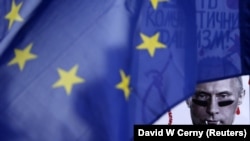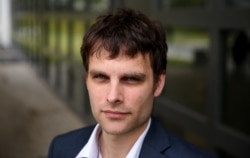Welcome to Wider Europe, RFE/RL's new newsletter focusing on the key issues concerning the European Union, NATO, and other institutions and their relationships with the Western Balkans and Europe's Eastern neighborhoods.
I'm RFE/RL Europe Editor Rikard Jozwiak, and this week I am drilling down on two issues: The EU's latest raft of sanctions against Russia and the EPC summit in Tirana.
Briefing #1: The EU's New Sanctions On Russia
What You Need To Know: The European Union's latest proposal for the next round of sanctions on Russia -- the 17th package since Russia's full-scale invasion of Ukraine over three years ago -- might just be its weakest yet.
Presented by the European Commission earlier this week to the 27 EU member and seen by RFE/RL, the proposal contains no hard-hitting economic measures against the Kremlin. Instead, it features more asset freezes and visa bans on various individuals and entities, mostly Russian citizens and companies involved in the arms industry.
It also includes banning 98 more ships from Moscow's so-called shadow fleet from being serviced at EU ports, bringing the total of ships on the list to 250. And lastly, it imposes export restrictions on 35 companies, most of which are Russian but others are Kazakh, Serbian, Turkish, and Uzbek.
Deep Background: The goal, according to EU officials RFE/RL has spoken to, is to adopt the proposal when the bloc's foreign ministers meet on May 20.
The club wants to show that Russia's numerous attacks on Ukrainian civilian infrastructure in recent weeks shouldn't go unpunished, and approval is also likely to be swift -- the new measures are so uncontroversial that even a sanctions skeptic like Hungary would be ready to give a ready thumbs-up.
According to diplomats familiar with the sanctions negotiations, Budapest will, however, request a certain proposed entity be scrubbed off the list. It's the Dubai-based Litasco, a subsidiary of the Russian energy giant Lukoil. Hungary is one of the very few EU countries still importing Russian oil.
Brussels wants to target the company as it has "enabled the procurement of numerous vessels forming part of the so-called shadow fleet," according to the proposal. "These vessels have transported oil from Russia while turning off or manipulating their AIS transponders, not maintaining adequate liability insurance or other financial security, as well as carrying out unsafe maritime operations."
There are also questions about whether blacklisting six proposed Chinese companies will fly given that some European capitals are wary of upsetting Beijing too much given the extensive trade links between Brussels and China. The most interesting of these are Poly Technologies, which has provided components for Russian military helicopters, and Skywalker Technology, a producer of the Gerbera drone that Brussels says "has been used by the Russian military in Ukraine, in particular as a decoy drone to overwhelm Ukrainian defense systems."
Drilling Down
• While this package seems insignificant, the EU has been working on separate sanctions measures targeting Russia in parallel to the 17th package. These are more thematic sanctions consisting of asset freezes and visa bans, and are set to be adopted later in May. These include blacklistings for human rights abuses, the use of chemical weapons, and "destabilizing activities" carried out around the world.
• The human rights violation package targets 28 people, all Russian judges and prosecutors, who are responsible for either targeting the deceased Russian opposition politician Aleksei Navalny and his associates or for sentencing Russians for spreading anti-war messages online.
• The chemical weapons proliferation listings target three entities, including the Radiological Chemical and Biological Defense Troops of the Russian Defense Ministry. In its reasoning, the EU is for the first time formally accusing the Kremlin of using chemical weapons on the battlefield in Ukraine.
• The proposal also targets 21 individuals and companies for destabilizing activities around the world. These include two people accused of being behind attacks on vehicles of the Estonian interior minister and the editor of a Russian-language newspaper in Tallinn.
• Others include Elena Kolbasnikova, a Russian national accused of creating "political structures with the German anti-democratic extreme political right in support of Russia's destabilization of Ukraine," Alina Lipp, a war correspondent with the Russian armed forces in eastern Ukraine, and German blogger Thomas Roper, who "disseminates misinformation about Russia's war of aggression against Ukraine and delegitimizes the Ukrainian government."
• Two targeted Moldovan nationals, Ivan and Iurie Neculiti, run a Web hosting service registered in the United Kingdom called Stark, which reportedly enables "various Russian state-sponsored and affiliated actors to conduct destabilizing activities including coordinated information manipulation and interference and cyber-attacks against EU and third countries."
• There are also a handful of people who allegedly spread Russian propaganda in various African countries and a Russian fishing company, Murman SeaFood. This company is the owner of a vessel that according to the EU "has repeatedly shown untypical behavior and navigation practices inconsistent with their normal fishing activities, including presence in close vicinity to an ongoing NATO military exercise and regular presence close to Norwegian critical infrastructure and military sites."
Briefing #2: Why Europe's Leaders Are Gathering In Tirana This Week
What You Need To Know: On May 16, leaders from all over Europe are gathering on Skanderbeg Square in central Tirana for the European Political Community (EPC) summit. The EPC, an idea conceived by the French President Emmanuel Macron as a direct response to the war in Ukraine, meets at the highest level twice a year with the host rotating between the 27 EU member states and the 20 non-EU countries.
Now it's Albania's turn, and the event will be something of a crowning achievement for Prime Minister Edi Rama. In power since 2013, he is already one of the most experienced operators in the room, and the meeting comes just five days after a general election in the Western Balkan republic in which his socialist party will finish on top yet again.
Brussels holds Rama in high esteem, with EU officials praising him for his diplomatic skills and sharp wit. A reflection of this is the fact that Albania, within a year, has opened a majority of the EU accession chapters and is set to open some more by the end of this month.
Deep Background: The EPC is not an EU vehicle, nor is it a substitute for EU membership as some EU hopefuls fear. Essentially it's a forum for talking shop that doesn't officially produce any concrete deliverables or final communique; it has no permanent seat or secretariat.
While media representatives are struggling to explain what sort of animal it is and what purpose it serves given there are so many other European institutions (such as the Council of Europe and OSCE, to name a few) leaders appear to love attending its summits.
This is largely because there is minimal official choreography compared to, for example, NATO and EU summits, which follow strict protocols. Sure, there's an opening ceremony, a plenary session. and a family photo. Leaders are then divided into three thematic roundtables focusing on security, competitiveness, and migration.
Most of the one-day gathering, however, will be devoted to various planned and spontaneous bilateral meetings that can quickly turn into larger meetings if needed. It happens without too many accredited aides and advisers, meaning a lot of diplomatic speed-dating and huddles in a nice setting with plenty to eat and drink. It offers "a little bit of freedom and creativity in their otherwise structured lives" as one diplomat put it to me.
Drilling Down
• At previous EPC summits, there were a political push to have Armenian and Azerbaijani leaders meet, often together with the French and German leaders, but it is my understanding that no such attempts will be made this time around even though it can never be ruled out.
• Who's coming? So far, I've been told no one has declined the invitation that went out to all European nations bar Belarus, Russia, and the Vatican. The three presidents of the European Council, Commission, and Parliament will attend, as will NATO Secretary-General Mark Rutte.
• This will be German Chancellor Friedrich Merz's first multilateral meeting, as well. Ukrainian President Volodymyr Zelenskyy is expected to show up even if it's not confirmed till the last minute, and Turkish leader Recep Tayyip Erdogan is also expected to come after having skipped some of the previous EPC summits.
• Georgian Prime Minister Irakli Kobakhidze is invited, as he was to the last one in Budapest in November. EU diplomats are keen to point out that the Tirana meeting is EPC and not the EU, consider the latter has a policy not to engage with high-level Georgian officials after the contested Georgian parliamentary elections last October. If Kobakhidze shows up, it will be interesting to see how EU leaders react.
• In a similar vein, it will be worth watching how leaders interact with Serbian President Alexander Vucic and Slovak Prime Minister Robert Fico as both attended the Victory Day parade in Moscow on May 9, rubbing shoulders with Vladimir Putin.
• Fico is largely isolated on the EU level even though no types of sanctions or punishment are in the making after his Moscow trip. Brussels warned Vucic not to make the journey to Russia, noting that as an official candidate country Serbia should align with the bloc's foreign policies.
• Vucic looks set to get away with it though. A senior EU official confirmed at a background briefing ahead of the Tirana summit that Serbia will remain a candidate country and there's no consensus among member states to impose sanctions on the country.
• The only consequence will be that Serbia won't advance on its EU accession path -- something that is rather moot anyway as the Balkan republic hasn't opened a single negotiating chapter in the past four years.
Looking Ahead
It is a big week for NATO. On May 14, the chiefs of defense of the military alliance's 32 members meet in Brussels for their last session before the NATO summit at The Hague next month.
Support for Ukraine and NATO missions, operations, and defense plans will all be top of the agenda. On the same day but in the Turkish seaside resort of Antalya, Rutte will gather NATO foreign ministers for an informal two-day meeting. The gathering is controversial given Turkey's repressive policies against the opposition, notably the recent jailing of Istanbul Mayor Ekrem Imamoglu.
That's all for this week!
Feel free to reach out to me on any of these issues on X @RikardJozwiak, or on e-mail at jozwiakr@rferl.org.
Until next time,
Rikard Jozwiak







